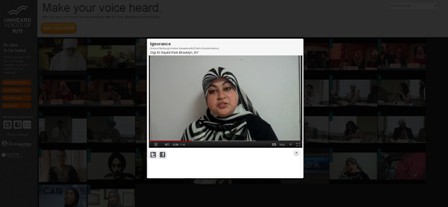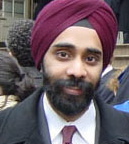 Working to document the day-to-day harassment and violence experienced by Americans of South Asian, Muslim and Sikh heritage, the Sikh Coalition of America last Friday launched a website of personal stories in video format designed to dispel myths about their communities.
Working to document the day-to-day harassment and violence experienced by Americans of South Asian, Muslim and Sikh heritage, the Sikh Coalition of America last Friday launched a website of personal stories in video format designed to dispel myths about their communities.
The "video wall," Unheard Voices of 9/11 is the civil rights organization's effort to document how peoples' lives have been impacted by discrimination after 9/11, by inviting community members to tell their own anecdotes of bullying, harassment, and just plain being singled out as "potential terrorists."
Anyone impacted by such discrimination is invited to upload their stories to the wall.
"One year after the 9/11 attacks, the Federal Bureau of Investigation (FBI) recorded a 1,600 percent increase in the number of reported hate crimes based on bias toward Muslims and those perceived to be Muslim," the group says. "To this day, Sikhs continue to be targeted for hate crimes, employment discrimination, and school bullying by ordinary citizens, and profiling by law enforcement agencies."
 "Members of the Arab, Muslim, Sikh, and South Asian American communities were twice victims of 9/11," said Amardeep Singh, at left, co-founder and program director of the Coalition. "Like all Americans we endured a horrific attack on our country by terrorists. We also continue to endure backlash discrimination and violence by our fellow Americans. 'The Unheard Voices' project is designed to ensure that our history is documented and that our voices are not ignored."
"Members of the Arab, Muslim, Sikh, and South Asian American communities were twice victims of 9/11," said Amardeep Singh, at left, co-founder and program director of the Coalition. "Like all Americans we endured a horrific attack on our country by terrorists. We also continue to endure backlash discrimination and violence by our fellow Americans. 'The Unheard Voices' project is designed to ensure that our history is documented and that our voices are not ignored."
Singh spoke this week with The Skanner News about his work and the purpose behind "Unheard Voices of 9/11."
The Skanner News: Tell me about the '9/11 Unheard Voices' website. What is it?
Amardeep Singh: The website is a video wall that allows members of the Muslim, Sikh, Arab, South Asian communities to talk about discrimination against Arab communities as a result of 9/11. There's a belief that many of the stories of school bullying, racial profiling, hate crimes, employment discrimination, haven't been adequately captured by our government or the larger media, and this is an effort to take our stories and tell them ourselves and preserve them for posterity. That's really what the website's about.
TSN: And it looks like it's very graphics-driven, very accessible.
Singh: Absolutely, so anyone can go on the site, and let's say you want to learn about how school bullying has affected members of our communities. There's a dropdown and you go to "school bullying." Same for "hate crimes" and "racial profiling" and the like.
TSN: Talk a little bit about what you are seeing as you put this website together. What is the upshot of how people have been impacted since 9/11? What is the moral here?
Singh: I think what's happened is right after the attack, the more open discrimination like hate crimes was prevalent. That has gone down markedly since the last 10 years. What has happened is you're seeing softer forms of discrimination like school bullying; the extra checks that members of the Sikh community get at the airport; the extra questioning that members of the Muslim community get at national borders. That has become not only prevalent, but has gotten worse since the attacks.
And I think the dynamic here is that while violent discrimination has gone down, the popular image in the public mind -- for example, that equates a turban and beard with terrorism – has gotten worse. It's solidified. The last 10 years has been about taking that image of turban and beard and really driving home through popular media that this is the image of a terrorist. And of course as regards the Sikhs, a terrorism and beard have nothing to do with terrorism.
And what you end up seeing for example is our organization has done surveys of hundreds of young Sikh school students, both in the Bay Area and New York, and what's so disturbing about those surveys is that in both areas over 70 percent of turban-wearing boys report some sort of bullying, teasing, harassment, based on a supposed association with Osama bin Laden or the Taliban and the like. And over 30 percent on both coasts have been reporting unwanted physical touching or hitting.
These are crisis-level numbers and I think it's a reflection of what's happening – the dialogue that is happening among the adults and the images that are out there of the turban and beard. There's just a lot of ignorance to still be dispelled 10 years out.
TSN: I know that in some of our other communities there's a sense of us versus them. And so how does it benefit everyone in the country to embrace this awareness of how people have been hurt by 9/11-related discrimination in unintended ways? How does everybody benefit by what you're doing?
Singh: It's important that we – I think a vast majority of Americans don't want discrimination in our midst. And the only way to resist this is to document it.
People just don't know; the only real way to address the issue is document it, to say this is happening. I know America doesn't like little children to be bullied, I know you don't like old men to be physically attacked. Let's put an end to this and the first step is to acknowledge that it's happening and to document it.
I think that the other thing this project does is it allows community members to speak in their own voice, and oftentimes when people see the faces – for example of the women in the hijab who is Muslim or a Sikh young boy or a man in a turban, there might be all sorts of assumptions about how they're going to speak. And when they get out there on the video wall on our website, and they're speaking for example without an accent because they were born and raised in this country, I think that helps to dispel a lot of myths also about our communities.
For example if somebody would get to know me they would know I was born and raised in the United States, I played little league baseball, my mom was a soccer mom, I'm a die-hard New York Yankees fan – when people tell me to go home I don't have anywhere to go except New Jersey, where I'm from. So I think this documentation project, done via video so that average people's voices can be heard, is just critical in putting forth that we have a problem here, and that it's a problem happening to good people who are just like anyone out there.
TSN: What's the most important thing that people should know about this project that you're doing?
Singh: I think the most important thing is that the project engages in truth-telling about discrimination in our country, and that truth-telling will hopefully lead to dialogue and eventually change. But the project is about getting voices that haven't been heard, heard. So that the myths that are out there are hopefully dispelled.
Go to the website by clicking here












































































































































































































































































































